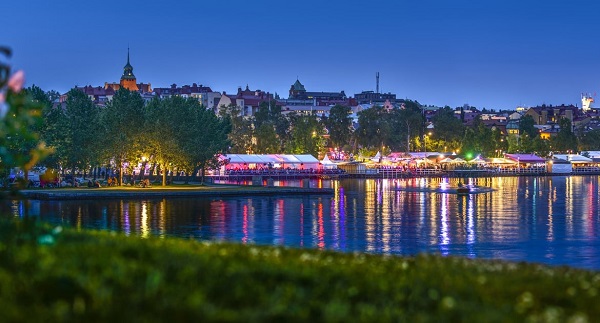International
Europe Can’t Survive Without America

 Sven R Larson
Sven R Larson
But it is not America’s job to save the old continent
The most beautiful place in the world is located smack dab in the heart of northern Europe. It is a small town called Östersund. It stretches along the eastern shore of Storsjön, the “Great Lake”.
Across the strait from Östersund is the island of Frösön. From the farmlands in its center, you can see 30 churches, dense forests, crop fields, and on the far side of the Great Lake a horizon filled with snow-clad mountains. There is a church there, on the Frösön, where the world’s happiest marriages begin: when the bride walks out from the church, she is so overwhelmed by the gorgeous view that she forever loses her ability to speak.
My Swedish hometown is not the only place where Europe brims with beauty. From endless oceanic views in Ireland’s Galway to the meandering riverside cityscape in Budapest; from the midnight sun in Nordkap to the seductive darkness of Palermo; cities that let you marinate in living history, like Munich, Stockholm, Vienna, Rome, and Edinburgh.
Europe has it all. And yet, that continent is slowly, sadly, but inevitably sinking. It is a terrible conclusion to reach, but I see no other path forward for them.
Thanks for reading Larson’s Political Economy!
Subscribe for free to receive new posts and support my work.
There are a multitude of reasons for this; the destruction of such a solid piece of civilization does not come easy. Which, in all honesty, is a tribute to the solidity of the Western project in itself: it takes decades of political and economic mismanagement to bring a continet of 500 million people from the top of world prosperity into the murky quagmire of industrial poverty.
However, that is precisely what the Europeans are now doing. Their decline only seems to be reinforced by every new measure to prevent it.
From an American viewpoint, the increasingly depressing state of Europe has not yet risen to the peak of the news cycle. Perhaps it never will, but the transformation of Europe from the world’s most advanced economy (alongside America) to an economy-class Latin America will have major economic, geo-strategic, and cultural consequences.
Before I dissect those consequences, let me point to the main character traits of Europe’s self-inflicted demise.
Lack of Leadership
If there is one thing Europe does not have, it is visionary political leadership. Not that our own crop of political heralds in Washington are much to brag about, but the new Trump administration actually does have an idea of how to make America better. By his fast-paced, confident leadership, Trump is now challenging the Democrats to step up to the plate; with a little bit of luck, we will go into the coming elections choosing between candidates running on different versions of “America’s best days are ahead of us”.
None of that exists in Europe. To the extent their leaders formulate ideas for the future, it is all about how government can spend more money, regulate more of the private sector, and dole out grants to NGOs to run the internet era of a billboard campaign themed around some empty political slogan. This is endemic in the EU, and it has tangible consequences: just last year the Europeans realized that America was running away with the path to artificial intelligence, while Europe has not yet even built its own Silicon Valley for old-school computer technology.
The realization among Europe’s political leadership that they are losing the AI race led the EU to issue a report suggesting more regulations on private-sector AI development and more government spending to investigate the potentials of the AI revolution.
Such is the European response to every issue, including the so-called green transition. When Americans elected a new president to end the mad dash into EV transporation—and instead let the free market be the arbiter on how we propel ourselves around town—the EU and national government leaders in Europe waged a virtual economic war on fossil fuels, without being even close to replacing it with “renewables”.
The German energy debacle went so far that major German manufacturers accelerated their foreign direct investments in other countries. This is one reason why there will be a lot more auto industry jobs here in America in the coming years. While European political leaders get fixated on some outlandish economic fantasy, America gets down to business, goes to work, and moves forward.
In addition to the fantasy that the green transition should be shoved down people’s throats by government, Europe’s political leaders have surpassed the Biden administration many times over when it comes to immigration—legal and illegal. Instead of asking pragmatic questions about the balance between a mostly uneducated labor supply and Europe’s perennially high unemployment rates, the elected officials and their unelected bureaucrats in Brussels, Paris, Berlin, and other EU capitals forge ahead like drunken cows. They have deliberately unhinged themselves from reality; it is only in a fantasy world free of opposing arguments that you can flood the streets of your cities with endless waves of immigrants, without causing major social, economic, and public safety problems.
A War on Democracy
Again, America is not immune to this kind of make-believe leadership, but unlike America, Europe has no voice of opposition. Where the Tea Party turned MAGA movement showed how true democracy works, forging a nationwide organic alliance of voters, Europe has invented institutions, conventions, policies, and a political culture of efficiently suppressing opposition.
There is no First Amendment in Europe, which politicians in both the EU and national governments have taken advantage of. In what can only be described as a war on the core of democracy, the European political elite is fighting an increasingly aggressive battle against dissenting voices. National governments are formed not to further the will of the people, but to quell the voice of dissent.
Coalitions of resentment against the people have appointed prime ministers in Sweden, Finland, Austria, France. A coalition of resentment is trying to form a functioning government in Germany. Where hatred of a common adversary is the only common denominator, there can be no room for visions. All political eyes remain in the rearview mirror, anxiously trying to keep the distance from the last election results.
People are blinded by a common hatred they cannot see the future.
From the viewpoint of policy, the only thing that these coalitions of resentment can produce is a regurgitation of the past. This explains why there is no debate in Europe over the “green transition” and why there is only token talk about immigration. Prevailing paradigms, which caused people to vote for alternative parties, reign unchallenged.
As do their consequences. In other words, the more Europe’s anti-democratic leaders double down on policies that thwart free speech, choke their economy, and fragment cohesive societies, the more they will distance themselves and their continent from the future.
A Stupid Economy
Europeans pay far more in taxes than we Americans do. Income taxes often start at 30-40 percent—for the lowest incomes—and there are value-added taxes, VATs, on everything they buy. Excise taxes, “green taxes”, fees and administrative charges run amok.
At the same time, they don’t get much more than we do. If anything, they get less of most of things. In health care (which I hope to have time to write more about in closer detail), Europe’s foremost contribution is the waiting list. You have the right to health care, but that does not mean you can get it.
The same is true for the countries in Europe that have elaborate systems of child care: you have the right to it, but that does in no way mean it can find a spot for your kid when the time comes.
Europeans brag about their paid-leave programs. It is true that, e.g., parents can take a lot of time off from work to be with their kids. They also have long vacations. However, since these benefits are mandated by law, they are in no way reflective of what businesses can afford in terms of an absent workforce. Yes, it is nice to be able to be at home with your baby for the first year or 18 months of its life, but during that time your employer needs to hire a replacement.
When I talk to Europeans about their paid-leave system, they often suggest that we Americans have no paid leave at all. I point out that just because government does not provide it, does not mean it does not exist. We prefer to let employers and employees handle the paid-leave issue as part of a workforce benefits package.
Fixated on letting government take care of as much as possible of their lives, Europeans have created a welfare state that demands taxes close to—and sometimes higher than—50 percent of GDP. This is well above the 40-percent line where GDP growth permanently slows down; once the tax burden crosses that mark and no one cares, the country inevitably sinks into economic stagnation.
There is no advancement in the standard of living. Private purchasing power is no longer adequate to keep businesses going. Capital formation stagnates and eventually moves abroad. The tax base is eroded; a consequence-impaired governing coalition of resentment responds with even higher taxes.
All in all, Europe has ended up in a vicious downward economic spiral. Her leaders are unable to understand the problem, let alone offer a solution. Among the many repercussions of this is the slow decline in standard of living that is already passed on from parents to their children: each new generation of Europeans will find life to be a little less prosperous than their parents did.
The Role of America
For all these reasons—lack of leadership, a dwindling democracy, and a stagnant economy—the European continent is unable to break out of its self-inflicted societal stranglehold. But what made it drift into this fog of endless political self-harm?
In one word: America provided the Europeans with a shield of security during the Cold War. Germans, Brits, French, Dutch, Spanyards, and others got so used to living under the protective shield of American military might that they believed they no longer had to think about existential issues. Instead, they could spend their time inventing new entitlements for their welfare states.
Again: make-believe politics. They never thought that their growing welfare states would sink their economies; in fact, economists never thought that this would happen either. I was the first one to point out this relationship, and I did it only a decade ago.
Likewise, Europe’s make-believe politicians thought that they could enjoy free-of-charge American military protection forever. The end of the Cold War did not exactly change their minds: suddenly, they thought they had somehow “won” that war, and that they as the victors could dictate the terms of their own existence—without having to work for it.
When America gradually began orienting itself away from Europe, there was at first massive denial across the old world. Due in no small part to foolish rhetoric from our neocons (both Presidents Bush, Vice President Cheney and his daughter Liz, John Podhoretz, Senator Graham of South Carolina, Irving and Bill Kristol…), the Europeans were led to believe that America would still provide that shield of safety no matter how many other parts of the world we were engaged in.
But not even neocons last forever. Reality began poking through the European bubble of political fantasies during Trump’s first term; after a “breather” during the Biden administration we are now back to the harsh reality where America is asking the Europeans to do what every other nation, or union of nations, is doing: grow up and take responsibility for their own sovereignty.
In other words, America can save Europe, but it is not America’s business to do so.
The rational reaction to this from the Europeans would have been to open a vigorous, public debate over what priorities their countries should make: the welfare state or national defense? But instead of doing just that, they have gone into an Alice in Wonderland-style mental lockdown where politicians in every cardinal direction dispense edicts about throwing Gargantuan amounts of money into military expansion projects that they have no funds for, and no industrial capacity to deliver.
At best, Europe will fragment into regional coalitions of countries, where some will make a future for themselves and others will continue to sink. The four Visegrad states, Poland, Hungary, Czechia and Slovakia, are relatively strong economically. So are the Baltic states.
The Nordic countries could form a strong regional economy, but with Sweden suffering from political deadlocks, high crime, a corrupt government, and a perennially stagnant economy, that outlook is no longer possible.
Germany is an enigmatic entity in this context. If they cannot change their own energy policy, they are going to de-industrialize at a rapid rate. That, in turn, will likely lead to growing political tensions; is therean independent, non-communist East Germany in the cards?
Southern Europe is ironically the most resilient part of that continent. Greece, Italy, Spain, and Portugal have survived centuries of prosperity, poverty, war, and peace. They will find a way to muddle through a glacial but politically and economically visible European implosion.
The comparison to Latin America is more accurate than it might seem. Before World War II, Argentina, Uruguay, and Brazil were among the best, most thriving economies in the world. Then the welfare state happened…
Thanks for reading Larson’s Political Economy!
Subscribe for free to receive new posts and support my work.
Larson’s Political Economy is free today.
But if you enjoyed this post, you can tell Larson’s Political Economy that their writing is valuable by pledging a future subscription.
You won’t be charged unless they enable payments.
International
Biden’s Autopen Orders declared “null and void”

In a 91-page report released Tuesday, the House Oversight Committee accused Joe Biden’s inner circle of executing and concealing presidential actions without his knowledge, declaring that any orders signed through the autopen were “null and void.” The Republican-led panel, chaired by Rep. James Comer (R-KY), said it uncovered evidence that senior aides used the mechanical signature device to authorize pardons, commutations, and executive directives while Biden’s mental and physical decline worsened — all to preserve “the illusion of presidential authority.”
Joe Biden WAS NOT running the show.
Our new report EXPOSES how Biden's decline was real and his aides covered it up.
Aides didn't even know WHO was operating the autopen to sign official documents and pardons.
Watch the truth they tried to bury 👇🏻 pic.twitter.com/WkQsy5k6uC
— Oversight Committee (@GOPoversight) October 28, 2025
“The Biden Autopen Presidency will go down as one of the biggest political scandals in U.S. history,” the report stated. “As Americans saw President Biden’s decline with their own eyes, his inner circle sought to deceive the public, cover up his condition, and took unauthorized executive actions that are now invalid.” The committee urged the Justice Department to launch a full criminal investigation into what it called a “cover-up of historic proportions,” naming several aides who invoked the Fifth Amendment when questioned about their roles. It also demanded the D.C. Board of Medicine investigate Biden’s physician for allegedly hiding his true medical state.
According to the report, internal emails and documentation revealed a “haphazard process” surrounding clemency and other executive actions, with no reliable record confirming Biden’s personal approval. Comer said the findings raise profound constitutional concerns. “If unelected aides were using the autopen to execute presidential powers without Joe Biden’s knowledge or consent, that is an assault on the Constitution itself,” he said.
The White House has not yet responded.
Canada Free Press
The real genocide is not taking place in Gaza, but in Nigeria

From Canada Free Press
Global conflict has reached its highest level since World War II, fueled by a surge in terrorist insurgencies, political upheaval, and full-scale wars in Ukraine, Gaza, Sudan, and dozens of other regions. According to the Peace Research Institute, there are 61 active conflicts across 35 countries.
In the longstanding and brutal ledger of religious persecution, Nigeria now occupies its own grim chapter with its enduring pogrom against Christians. Nigeria is the largest populated nation on the African continent and has become the crucible of suffering for its Christian minority.
Nigeria’s Christian communities are enduring one of the worst persecutions in modern times, yet the world treats it as a nonstarter
Islamic insurgents strike at night, torching homes while families sleep. They ambush churches during Sunday services, gunning down entire congregations. They raid Christian farming villages, slaughtering men, raping women, and abducting children. These are coordinated acts of religious cleansing with survivors forced to convert to Islam or be killed.
The violence throughout the years against Christians in Nigeria has only intensified. According to the Nigerian watchdog group Intersociety since 2009 more than 52,000 Christians have been killed and over 20,000 churches have been desecrated or destroyed.
These are not isolated events.
In 2024, 4,100 Christians were killed in Nigeria that was 82% of all Christian martyrdoms worldwide. By August 2025, more than 7,000 were killed.
This surge reflects not just a crisis of security, but a deepening pattern of persecution that is nothing short of genocide. As the Church marks each martyrdom with prayer and remembrance, the Body of Christ in Nigeria continues to suffer wounds that cry out for justice, solidarity, and global witness.
Global Christian Relief and other worldwide monitors have named Nigeria the deadliest country for Christians, a title that reverberates with the quiet void of global indifference.
These atrocities are driven by a network of Islamist extremist groups that include Boko Haram, Fulani militias and dozens of other factions with ties to ISIS and al-Qaeda. Their coordinated campaigns have devastated Christian communities not only across Nigeria but the entire African continent at an alarming rate that continues unabated.
The silence of the world echoes the hush of Good Friday when injustice at its zenith and was dismissed as routine, while suffering and death was business as usual. Nigeria’s Christian communities are enduring one of the worst persecutions in modern times, yet the world treats it as a nonstarter.
Before leaving office in 2020, the Trump administration took action by placing Nigeria on the State Department’s list of “Countries of Particular Concern,” (CPC). The CPC list allowed for economic sanctions to pressure Nigeria’s government to protect Christians and other religious minorities from violence.
However, in 2021, the Biden Administration removed Nigeria from the CPC even as the massacres intensified without due cause.
As a result, the Nigerian government, through either willful complicity or gross negligence, has enabled these atrocities to persist unchecked. Its failure to act is a betrayal of its citizens.
In response to the ongoing Nigerian massacre, a coalition of religious leaders, spearheaded by Nina Shea of the Hudson Institute’s Center for Religious Freedom, sent a petition to President Trump on October 15 condemning the Nigerian government’s treatment of religious minorities and urging Trump to redesignate Nigeria to the CPC. Among the signatories were San Francisco Catholic Archbishop Salvatore Cordileone, Family Research Council President Tony Perkins, Focus on the Family President Jim Daly, among dozens of others.
The petition unequivocally states that the Nigerian government “is directly violating religious freedom by enforcing Islamic blasphemy laws that carry the death penalty and harsh prison sentences against citizens of various religions. It also demonstrably tolerates relentless aggression uniquely against Christian farming families by militant Fulani Muslim herders, who appear intent on forcibly Islamizing the Middle Belt.”
This crisis transcends geopolitics and foreign policy and is in desperate need of a moral imperative. As St. Paul affirms in 1 Corinthians 12:26, “If one member suffers, all suffer together.” As members of the Body of Christ, Christians are called to bear witness, speak out, and act to end the atrocities unfolding across Africa.
Without intervention, the Christian population in many regions faces displacement within a generation.
Don’t think it can’t happen here.
-

 Business12 hours ago
Business12 hours agoTrans Mountain executive says it’s time to fix the system, expand access, and think like a nation builder
-

 Business1 day ago
Business1 day agoThe painful return of food inflation exposes Canada’s trade failures
-

 Business1 day ago
Business1 day agoCBC uses tax dollars to hire more bureaucrats, fewer journalists
-

 Sports2 days ago
Sports2 days agoWhile Ohtani marches into MLB history, Nippon league’s shame lingers
-

 National1 day ago
National1 day agoElection Officials Warn MPs: Canada’s Ballot System Is Being Exploited
-

 Business1 day ago
Business1 day agoPaying for Trudeau’s EV Gamble: Ottawa Bought Jobs That Disappeared
-

 Bruce Dowbiggin1 day ago
Bruce Dowbiggin1 day agoIs Roundball A Square Game? Sports Betting Takes Another Hit
-

 Alberta1 day ago
Alberta1 day agoCoutts border officers seize 77 KG of cocaine in commercial truck entering Canada – Street value of $7 Million









